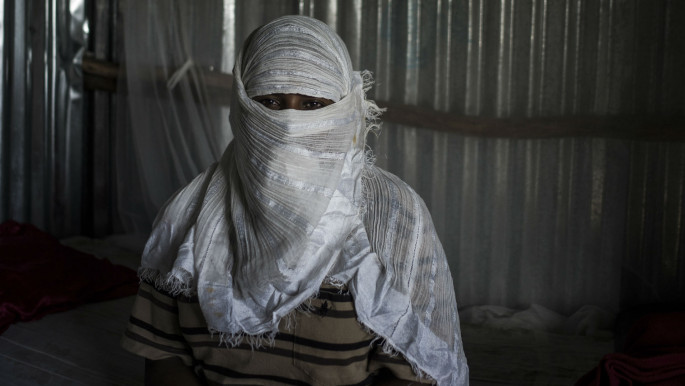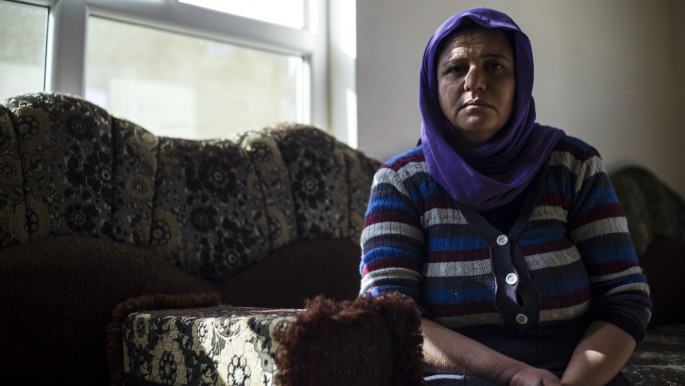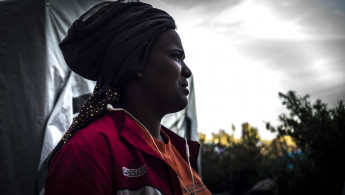The women in the shadows of Europe's refugee camps
Gouma Makil died one morning in early March.
The Sudanese migrant's death in the refugee camp in northern France known as The Jungle was sudden and unexpected, a heart attack at dawn.
By mid-morning, his friends had congregated around a large tent, a temporary dwelling that they shared, and had begun to grieve.
At the edge of the group was a sight uncommon in communal areas here - a woman.
She sat a metre or so from the group of men, on an overturned plastic box, grieving the death of her friend, sobbing gently into a scarf.
It would be a mistake to think that women aren't present in Europe's migration crisis. While many in the past half-decade have moved only as far as camps in Lebanon and Jordan, losing their husbands to the promise of Europe - in the hope that they will soon be reunited - in 2016 the number of women and children making the journey into "Fortress Europe" will outnumber men for the first time.
So why, if there are all these women, are they seemingly invisible in Europe's refugee hotspots?
 |
|
| In pictures: Click here for Gus Palmer's photoessay on refugee women |
The truth is, while female refugees have fled the Islamic State group, Assad and abject poverty, what greets them in Europe is a very different kind of vulnerability - one that often confines them to the shadows.
Asal, a Syrian woman, is one of the many thousands who have fled Aleppo. Daily airstrikes and artillery shelling have rendered it safe for no one.
"I've been lucky," she told The New Arab. She has survived cataclysm in her home nation, overcrowded, makeshift boats in the Mediterranean, the cold in Idomeni, and stasis in Calais.
While in Turkey, however, Asal witnessed the most appalling scene - as migrants were being sorted onto two trucks in preparation for the voyage to Greece, at the last minute it was decided there were too many people on her truck, and so a smuggler jumped on and ripped a young boy from the arms of his mother, a woman Asal hadn't spoken to.
Showing no mercy the smuggler placed the boy on the other truck. Immediately the trucks sped off in different directions, towards different launching-points for the crossing to Greece.
"All we heard is that the other boat didn't make it," Asal said.
 |
It became too dangerous, even to walk down the street... Every day you worried that it was your last |  |
She witnessed the remains of a family being destroyed by one man, his only source of power being the keys to Europe.
This is just one of the many stories about the ruthlessness of the smugglers. Asal says they are willing to kill anyone that gets in their way. According to Asal, if you try and board a truck without a smuggler's say-so, "they will stab you... many of them carry guns as well… they have complete hold of Calais".
It's well documented that thousands of refugees go missing every year, drowning in cold seas, or left for dead in the desert or on the roadside.
 |
|
| In pictures: Click here for Gus Palmer's photoessay on refugee women |
And those who are lucky enough not to die on the journey often arrive in the hands of some of Europe's most dangerous criminals.
Like all refugees, Asal's decision to put her life in the hands of those who possess a monopoly on hope turned her into a vulnerable non-person. She, like many others, has been relinquished of citizenship and identity. Doctors, lawyers, housewives, engineers - regardless of title, profession or status, day after day, month after month they are progressively relieved of their identity, becoming part of the tragic solidarity of desperation.
Sarah, a Libyan, fled Benghazi. "It became too dangerous, even to walk down the street," she told The New Arab. Bullets, persecution and the daily threat of kidnapping. "Every day you worried that it was your last."
In sheer desperation, Sarah sold her house and embarked on the treacherous journey to Europe.
She retained a few sentimental items, spare clothes and things to remind her of Libya before the war. Bit by bit these were stolen, taken from her by smugglers. Valuable items were kept to be sold, anything else took up space that could be used to transport more migrants, and so was left by the wayside: more migrants - more money.
"Once you've paid the smugglers they don't care about safety, they just want your money," she said. "It was a hot day, but they wouldn't let me keep my water, they told me it took up too much space… many people were sick from the sun, a young child next to me collapsed, but still the truck kept going.
"At the start you believe that smugglers are the heroes, that they will help you because governments won't, but they are not heroes, they don't care about us, they don't care if we die, as long as they get the money."
Once women like Sara and Asal reach Northern Europe their struggle continues. Those stuck in bottleneck, limbo-like camps in Calais, Dunkirk, and Idomeni are terrified.
Rosa, who fled Sudan, is no different. She lives in the Syrian quarter of The Jungle - it's by far the safest place, she says.
"I am too scared to go outside," she says as aid workers arrive with parcels of food; Rosa asks others to collect them for her. These moments typically attract large crowds and, like Rosa, most women are terrified of men seeing them, knowing they are there and working out where they are staying.
"It's not safe to be a woman here," she whispers.
Sophie, who also fled Sudan, is testament to Rosa's fear. She was offered protection by a group of men in The Jungle. The fee for protection? Sexual favours. When she refused to pay up, she was gang-raped.
At night, the jungle becomes a very uneasy place; rape is not uncommon. It is not a place that anyone should have to call home, and women, in a minority, facing prejudice and lack of status, are especially vulnerable.
Sophie rarely leaves the area where she sleeps. Sitting in a damp, barely lit hut, incarcerated by fear and refusing to go outside, she waits until the early hours of the morning before leaving the camp, in the hope that she can get on a truck bound for London.
 |
It's not safe to be a woman here |  |
Despite often being referred to as a "the new weapon of war", rape and sexual violence have been a feature of conflict for centuries. They're also a feature of the migration crisis. Transit zones, like Calais and Idomeni, aren't well policed and there are no courts. It remains asecret crime.
 |
|
| In pictures: Click here for Gus Palmer's photoessay on refugee women |
The possibility of being raped is yet another risk that women here must face.
For many, it means they are afraid to participate in daily life. Many have fled an IS-led society where they fear to object - but now they find themselves in a European one, where they fear to be seen.
Despite this, in extreme desperation, The Jungle has acquired its first brothel. Some women have reached a point of such despair, such desire to make enough money to complete the final leg of their journey, that they are prostituting themselves.
Escaping war and poverty and setting off on a perilous journey through Europe, women have been exposed to exploitation and violence. Yet Europe - which styles itself as the world leading proponents of women's rights - has chosen to look the other way.
Women in Idomeni and The Jungle are showing great resilience. Fear and uncertainty is driving them. "Women don't have time to sit around," says Julie, an aid worker. "They're not interested in journalists, many have kids and families to care for, all they care about is getting to England."
It's true. Asal, Sophie, Rosa and Sarah all have just one goal, something for which they have risked their lives and staked their futures - crossing the channel and finding a new life.
But for now, while they remain stuck on the European mainland, female refugees have no identity: they are at the bottom of the bottom, impounded in the margins. The prospect of a new life has, so far, proven enough to propel them through these horrors - but as the number of refugees making it into the UK via France dwindles, their future looks bleak.
They left their home nations to live in a society where they would be free to walk down a street without fear of being killed, robbed or raped - and now, in Europe, they are still struggling to find freedom.
Harry Leadbeater is a freelance writer based in London and San Francisco, covering the migration crisis in Europe and beyond.
Follow him on Twitter: @HLeadbeater01



